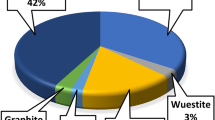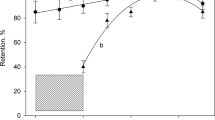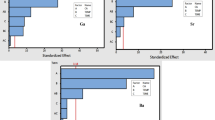Abstract
AN investigation into the mode of occurrence of nitrogen in coals necessitated devising a suitable method for its determination. The ordinary macro-Kjeldahl method was much improved in speed and reliability by using a mixed selenium–mercury catalyst with the usual potassium sulphate; but even in this case some doubt always existed as to when the conversion of all the combined nitrogen of the substances into ammonia was complete, and whether there might be loss of ammonia during the digestion, which was indeed observed when the temperature was greater than 370° C.
This is a preview of subscription content, access via your institution
Access options
Subscribe to this journal
Receive 51 print issues and online access
$199.00 per year
only $3.90 per issue
Buy this article
- Purchase on Springer Link
- Instant access to full article PDF
Prices may be subject to local taxes which are calculated during checkout
Similar content being viewed by others
References
J. App. Chem., 5, 373 (1954).
Author information
Authors and Affiliations
Rights and permissions
About this article
Cite this article
BEET, A. Potassium Permanganate in the Kjeldahl Method for the Determination of Nitrogen in Organic Substances. Nature 175, 513–514 (1955). https://doi.org/10.1038/175513b0
Issue Date:
DOI: https://doi.org/10.1038/175513b0
This article is cited by
-
Untersuchungen �ber die Aktivit�t von alkalischer Phosphatase und sog. Leucinaminopeptidase im Corpuscarcinom
Archiv f�r Gyn�kologie (1972)
-
Das Verhalten der Enzyme, Aldolase, Lactatdehydrogenase und Malatdehydrogenase beim unbehandelten Korpuscarcinom
Archiv f�r Gyn�kologie (1972)
-
Klinische Bedeutung des Vorkommens und der Verteilung von Aminopeptidasen im Ovarialcarcinom
Archiv f�r Gyn�kologie (1970)
-
Klinik und Pathologie der Lactatdehydrogenase im Ovarialcarcinom
Zeitschrift f�r Krebsforschung (1969)
-
Ern�hrung und biochemisch-mikro�kologische Vorg�nge im Enddarm von S�uglingen
Zeitschrift f�r Kinderheilkunde (1965)
Comments
By submitting a comment you agree to abide by our Terms and Community Guidelines. If you find something abusive or that does not comply with our terms or guidelines please flag it as inappropriate.



